Why I Took Away My Child’s Tablet || Slow Down Family Life with Less Screen Time
This post may contain affiliate links, which means I may receive compensation if you make a purchase using one of these links.
Screen time is often said to be the saving grace of mom life. If they’re entertained, you can have alone time or get things done. I believed it too…until it became anything but great.
Mom life is difficult, and if you work from home, or just need to get things done around the house, you’ve probably heard other moms say… “It’s okay to give them a little extra screen time”. There are certainly moments when this can have merit, but what I’ve experienced is that over time, that extra show here or there becomes a crutch.
Both for the parent and for the child. Here’s what happened to us.
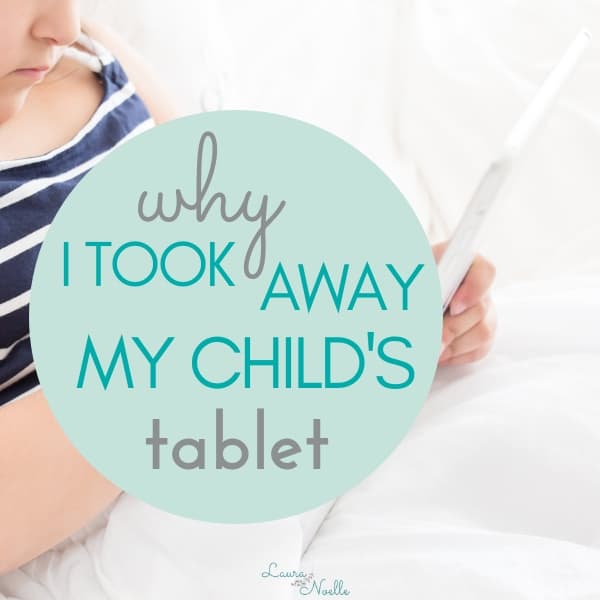
Kids & Tablets
My daughter was given a tablet with educational games on it and the PBS kids app when she was two. At that point, she had very little interest. Awesome!
While my degree in Early Childhood Development, I knew screen time wasn’t the greatest, and I tried to limit it. However, there were times it just felt necessary to entertain her so I could get something, anything really, done.
By the time she was three, we had downsized to a smaller house, and in the depths of winter weather, the overwhelm was real, and the iPad came out. She was allowed to watch kid’s shows on Amazon Prime, or a few movies and shows we had on Google Play.
As her energy went up and mine went down, I felt like I had to give in, in order to get alone time or things done. At first, it was magical. I got soooo much done. Hours of work were accomplished. I cooked dinner in peace. I could read a book.
She sat quietly, watching her shows.
But then, things started to get dicey. Her attachment to the device was getting stronger. It was the first thing she asked for every morning. It was hard to take it away at night. She talked about the things she saw on it all the time.
I started to feel uncomfortable, like something wasn’t quite right.
Screen Time Can’t Be That Bad… Can It?
I’d seen other simple living bloggers and communities talking about reducing screen time, but I always just thought, Glad it works for them, it wouldn’t work for me.
Eventually, I ran across mentions of a book called Reset Your Child’s Brain: a four-week plan to end meltdowns, raise grades, and boost social skills by reversing the effects of electronic screen-time by Victoria L. Dunkley, MD. My curiosity was peaked and I checked it out from our local public library.
While the bulk of the book addresses the severe effects of electronic screens on school-age children (and adults), there was some information addressed at young children as well.
In fact, after reading just chapter one of the book (the scientific basics of how screens cause continuous hyperarousal and overstimulation, leading to detrimental mood, behavioral and cognitive symptoms), I decided to pack up the tablets for good.
No educational games. No Prime Video. No YouTube. Nothing she could swipe, control or interact with.
I was genuinely surprised when I read the difference between passive screen time (like watching television from the other side of the room) and interactive screen time (smartphones, tablets, computers, video games). Dr. Dunckley writes “we associate passive viewing with inactivity, apathy, and laziness” and “in fact, parents are often encouraged to provide interactive screen time…with the rationale that surely this type of activity engages the child’s brain.”
The problem here is that “interaction is in and of itself one of the major factors that contributes to hyperarousal, so sooner or later, any potential benefit of interactivity is overridden by stress-related reactions.” (Reset Your Child’s Brain, page 20).
That’s just the beginning though, and as Dr. Dunckley laid out what a child’s continual fight or flight response looks like (aggression, meltdowns, etc.) and also withdrawal from electronic devices (ever tried to pull a three-year-old away from a screen at bedtime?? Yikes…), the sinking feeling in my stomach hit an all-time low.
This was far worse than I could ever have imagined, and if I didn’t do something now, it was only going to get worse.
And so, I read on. That was about a month ago.
The Electronic Screen Detox
While Reset Your Child’s Brain is not a light read, I do appreciate that Dr. Dunckley makes it very clear from the beginning that the negative effects of electronic screens can be reversed by simply removing them. She recommends a four week (in some cases longer) detox to help families reverse attachment, rebuild social connections and reduce stress.
She tells story after story of rather extreme cases of electronic screen syndrome where children eliminated screens and experienced (chapter three):
- Increased brain function (executive functioning and working memory)
- Better literacy comprehension
- Improved social skills and eye-contact
Among many other regained positive mood, cognitive and behavioral changes.
A particularly shocking piece of information stuck out to me that screen time causes the body’s blood flow to shift from “higher thinking” to “primitive thinking”. What does that mean? It means our screens are not making us smarter.
Dr. Dunckley states “Interestingly, when I’ve treated patients with the Reset Program and they continue to be screen-free afterward, they seem to mature developmentally in leaps and bounds–in a matter of months. This suggests that liberation from screens redirects robust blood flow back to the frontal lobe, thereby supporting healthy brain development” (page 46).
That frontal lobe she mentions is, of course, the higher thinking part of the brain that is in charge of critical thinking and executive functioning.
Whew. It’s a lot to take in, and it sent shivers up and down my spine.
So what’s the Reset Detox? Very simply put, it’s at least 3 weeks of no interactive screen devices (smartphones, tablets, kindle, laptop, etc.). There are options to remove screens related to schoolwork if you desire and either allow a very small amount of passive, slow television viewing from across the room, or remove TV as well.
The book takes you through the whole process step by step, so I highly recommend giving it a read if you want to know more.
What We Changed & the Difference it Made
Our family decided that interactive screen time is the worst for our young child. So the first rules that went into place were 1) no tablets, and 2) no smartphones. We already didn’t allow her to play on our phones, but it also made me realize that I was a little too attached to my smartphone, and I decided to reduce my usage.
At first, she asked for the tablet quite often and would beg and pout. But as the weeks went on, she asked less and overall, her moods absolutely evened out. Bedtime started going smoother. She fell asleep faster. She slept in longer in the morning.
Just the other day I peeked around the corner to watch her playing imaginatively with some stuffed animals and toys she hadn’t touched in months. By all means, her creativity wasn’t gone while she had interactive screen time, but there were visibly less imaginative play and a lot more begging to watch shows.
The differences I see from our tablet detox amaze me. Now, full disclosure, it has meant that I don’t have a lot of time to myself. I have to read her books, engage her in the work I’m doing, go to the park or store, get outside, etc. I have a lot less time to work on my business right now.
But I have noticed that she respects me more when she sees me reading a book than when she would see me scrolling through my phone. By using my own devices less, she has naturally become less attached to them herself.
Now, at this point, we haven’t totally cut out television screen time. About 3-4 times a week she is allowed to watch a show or movie we select together. Typically it’s a Disney Junior show or animated movie, which technically are on the “fast-paced and banned” list, but as of now, even these don’t affect her the way the tablet did.
One day at a time!
So What’s Next?
In a perfect world, I would ditch our TV, computers, and smartphones. But that isn’t possible as I work from home, my husband enjoys working on tech, and our family does like to enjoy a movie on occasion.
That being said, I do plan to continue to research and experiment in limitations, both for my child and for myself. The relief of removing the tablet is huge. Looking back I can see it was a source of conflict, frustration, and dependence that we just didn’t need in our lives.
I’ll be watching carefully to see how the current television screen time affects the family, and how I can reduce my own screen time even more by setting schedules, routines, and boundaries.
If you’ve ever noticed negative behaviors surrounding screen time, I urge you to dig deeper. There is no better way to slow down family life and improve relationships than reducing the screens!
Related Articles on Slow Family Life
- Do It Yourself Fairy Garden || Inspiring Imagination and Creativity in Kids
- DIY 10 Minute Citrus Aromatherapy Playdough
- DIY Nature Bubble Wands
WANT TO SAVE WHY I TOOK AWAY MY CHILD’S TABLET FOR LATER? PIN TO YOUR FAVORITE PINTEREST BOARD HERE:
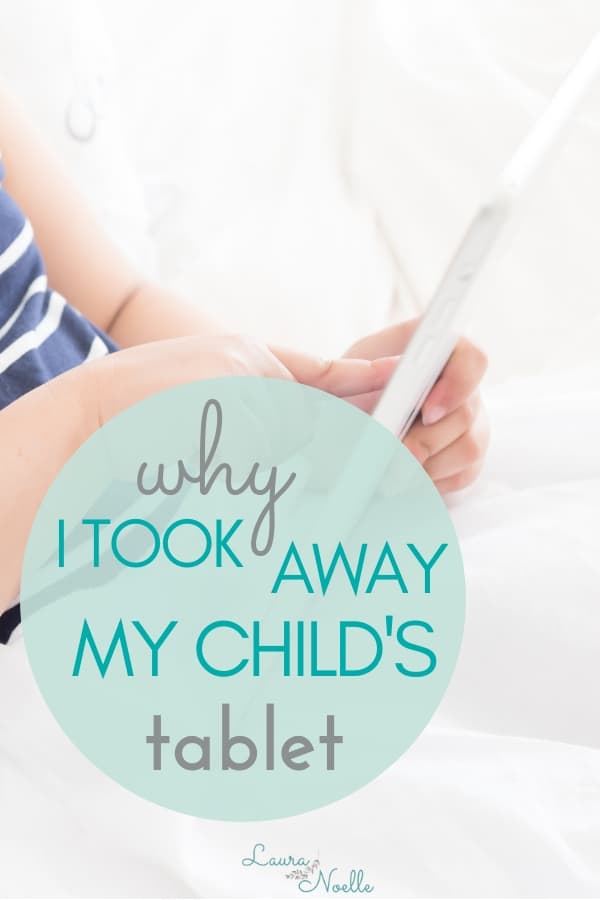
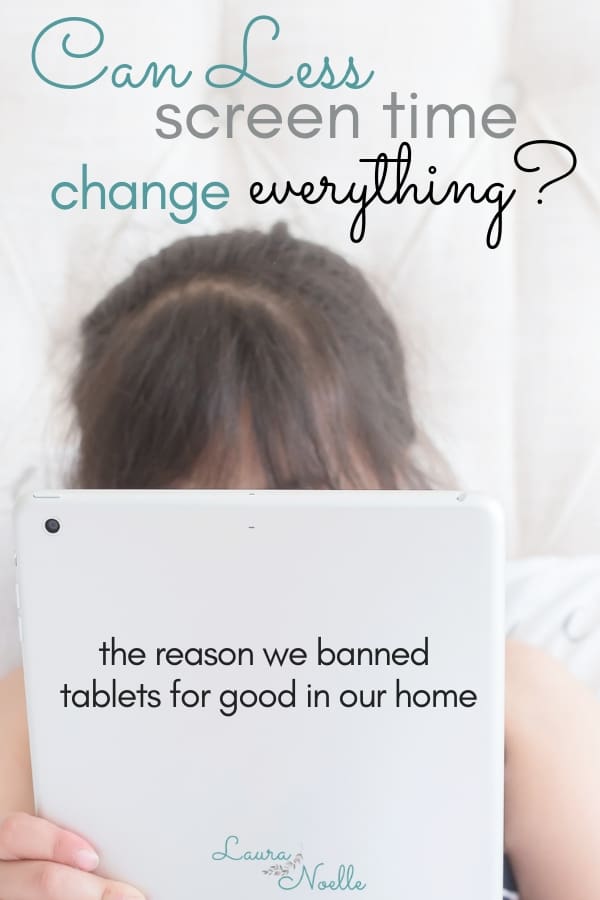
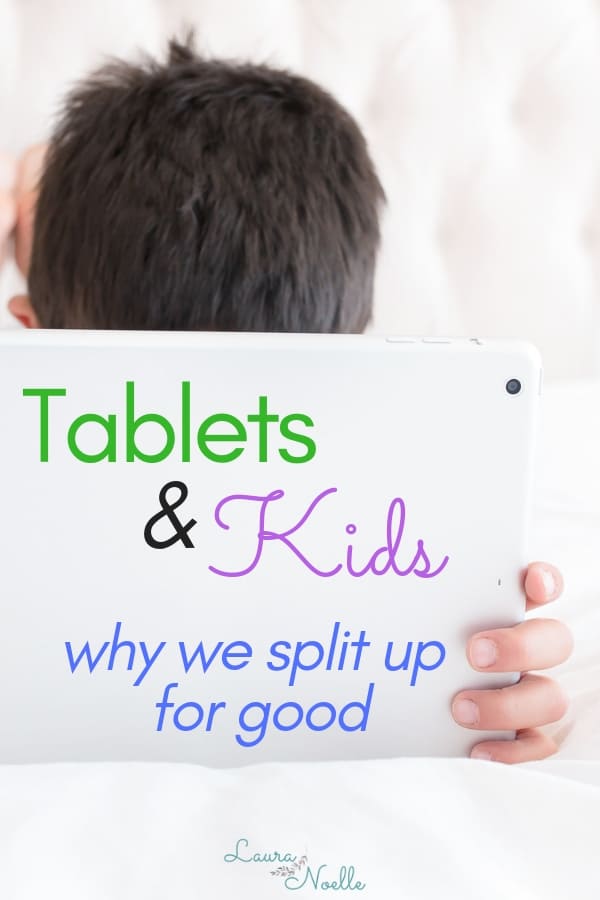
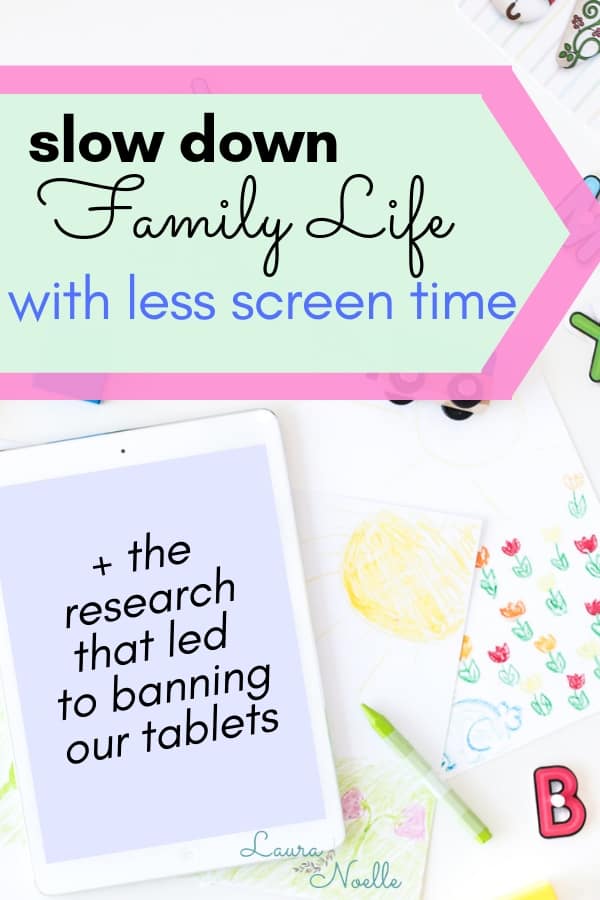

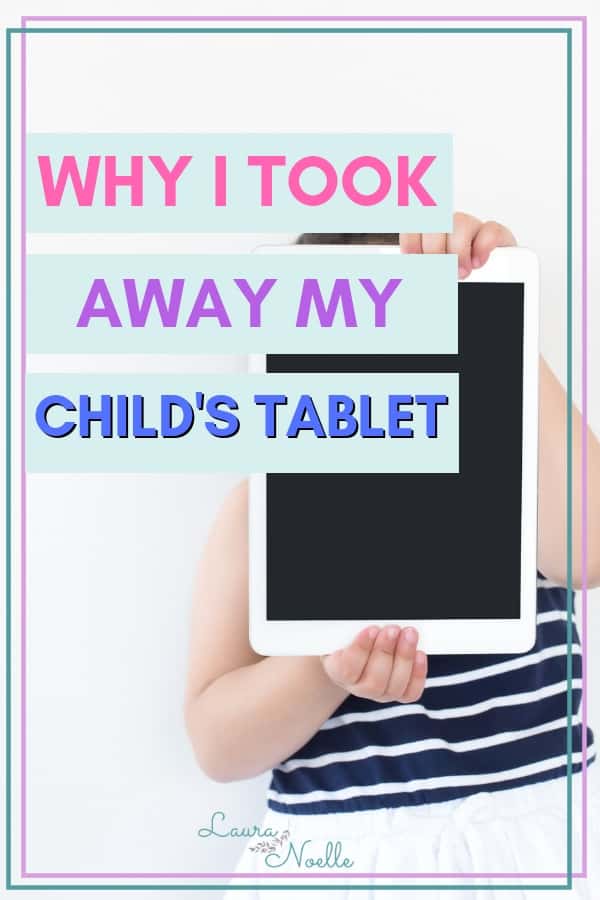



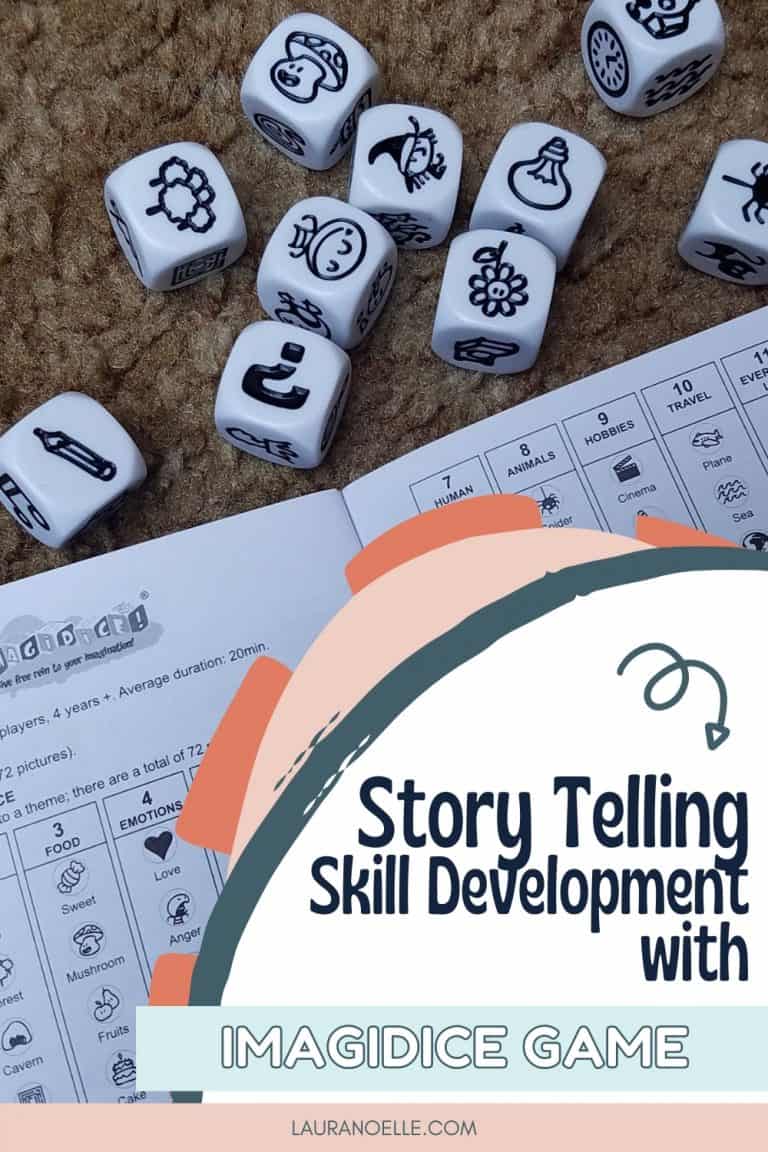

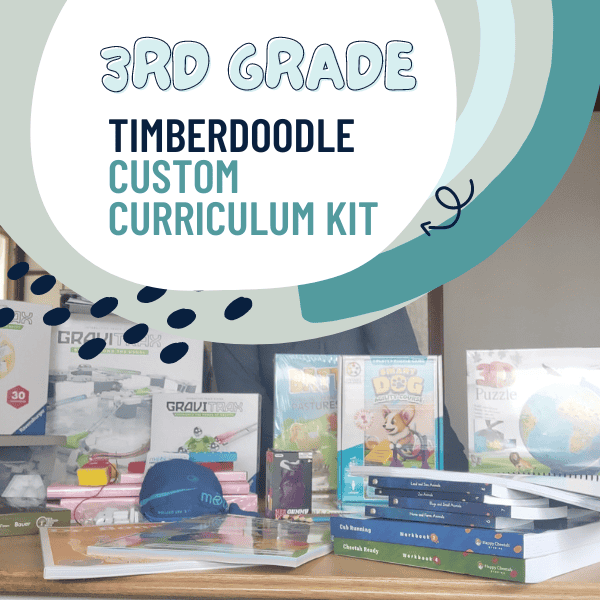
I have very strong feelings about screen time. I have been a teacher for 30 years, and for the past 13 years have owned my own education business. Part of my business is teaching 3-7-year-old children technology/STEM classes. My students are on the computers for a max of 20 minutes per week. We do not play random games. I have a curriculum that was designed to teach children to use technology as a tool. Everything my students do during my class is educational. They never ask me what are we going to play today? They always ask, “What problem are we going to solve today?”
It drives me absolutely crazy when I see a parent enter a school with a cell phone in hand rushing their children along while they talk or text. It also makes me crazy when I am in a restaurant and every member of a family is on a device. I could go on and on. I applaud you for researching and taking action. It is so very important!!! You are doing an amazing job!!!
Tammy, I completely agree with you–technology is a tool and should be taught and treated as such! My husband builds/works on computers and coding as a hobby, so I do highly value the skills, but in general, society has totally missed the mark. Sadly, most kids aren’t learning the skills, and instead, are merely using devices for recreation.
Your class sounds fantastic! I was very excited to find a homeschooling curriculum that focuses on STEM skills from birth to 12th grade, and my hands-on kiddo absolutely loves it. I look forward to teaching her about problem-solving and appreciating the tool of technology in the future!
Yes yes and yes! I think you are a superhero and very brave for taking this step. What happened to you happens to sooo many parents and yet they don’t take any action, letting their kids brain to atrophy and get worse by the day.I support everything you said in this article and while I’ve never had this problem with my kids, I see it around me so much that I feel like I really know the ins and outs of it. And don’t worry about your alone time. It will come back eventually :d
Aw, thanks. It is truly a trap that is hard to step back from, but so incredibly worth it! It is all around us, which makes us think it must be okay, but just like hidden dangers in our food and products, there are always risks manufacturers don’t want us to know!
I don’t like it when my mom takes away my iPad all beecause I said sea skeleton panda is real in roblox adopt me I she got so upset with and she says you can’t connect cartoons with real life you can’t just do that wtf has to anything with the creature?
I love this article! I have fallen prey to the notion of handing my two kids their tablets when I’m trying to get work done around the house. One day, my son had been on his tablet for 3 hours and I almost started crying. I realized his problem with the tablet started because of me. Since then, we have put limitations and have even started taking them away at times. Thank you for this insight!
Cathy, I know exactly how you feel! It truly was amazing to just put the tablet in front of her and get things done, but it started spiraling so quickly and I felt so bad when I realized that I had allowed it to get that way. Limitations are key–that’s great that you keep those in place!
Do you have any follow up articles on this topic? I need help detoxing my kids. I don’t know how to fill the time.
I can’t say how much I enjoyed reading this! My daughter just turned one and I’ve always been nervous about screen time as she gets older. I think it sort of numbs the brain to watch things all day long, instead of doing things. It’s important to teach them to be in the moment, especially when they are young. I’ll have to work on limiting my own screen time, too.
Melissa, it can be such a conflicting issue for sure! I was surprised at how much it made me realize I am way too attached to my own phone, and it’s been a process to work on being less connected. It ends up looking different for every family, but being aware and intentional is key!
I love this article. Cutting down screen time is extremely important!
I don’t have kids yet, but I need to implement it on myself. Cut down my screen time. When I am not blogging, I am on phone or TV. It is so bad!
I can totally relate! I used to binge watch show after show on my phone or tablet, and now I’ve realized I compulsively check my phone all day long, even though there is almost never anything important waiting for me! It’s an eye opener to how we spend our time, and what we are missing around us too.
Wow! Absolutely love how you communicated and shared so clearly the ramifications of excessive screen time for a child and even adults. It really made me evaluate how much we use devices in our home. We currently do not watch TV, just movies a few times a month if we manage to get time to squeeze it in. My husband did not have a TV growing up because his parents were very careful about the effects it could have on their children. As a result my husband is an avid reader but sometimes makes up for movie watching online since he was not able to enjoy it freely as a child ???? It makes me think it is best to do everything in moderation ????
Moderation is so important! That’s very interesting that your husband’s parents were even aware of negative effects so many years ago! Wow! I’ve found myself reading more books now, both on my own and with my daughter, and I realize how much we missed by just turning to our devices. Of course, we do still watch family movies a few times a week–again–moderation =)
Very interesting read. I don’t have a problem with screen time but I also don’t think a kid should be on a screen 24/7. Like when a parent hands their kid a tablet or cell phone just to keep them quiet annoys me. Our daughter learned so much from educational shows and apps before she turned 2 that it was a positive things for us.
I don’t take away screen time for her. I just tell her “want to play a game with me?” Or “I’m going to go outside and play. Would you care to join me?” Or “I’m going to read this book if you want to come sit with me and listen you’re more than welcome.”
I found giving her the option to do something else has been a great way for her to feel like it’s more her choice than me forcing her to do things. It’s also helping build her confidence.
It does seem that some people are more affected than others and it doesn’t always turn into behavioral issues. For our daughter, I noticed these issues in direct correlation to tablet use. She is still allowed to watch movies and some shows on the TV in managed times during the week. For whatever reason, she developed an attachment to the tablet so that she would not willingly put it away even if I tried to entice her with other activities. That’s awesome that your daughter responds to other choices! I think personality type can play into that, and as always, our job as parents is to do the best thing for our own child!
This is the reason my 4 year old has never had a tablet, however, this has convicted me of my own screen time, and the length of the shows my son is allowed to watch. Great post!
That is fascinating! I definitely feel like screen time should be limited much more than it is in our society. Thanks for sharing your experience.
This is very interesting! We have always limited screen time, and after reading this I am really glad we were so strict in the younger years.
We are a house that has to limit screen time as well. We often go through periods of detox and the few things I do allow through are generally for some level of educational benefit.
Very interesting. It is often difficult to balance everything we need to in our families but sometimes one must put children first. I find that now that our son has less screen time, he is back to reading books more and more on his own.
My kids have very limited screen time, but there are still times when I have to mindfully start a detox. Screens can buy a little bit of quiet, but it comes at a high price!
We’ve been considering this, too. Thanks for sharing this!
Yes! I’m all for low screen time. I think it would be good for myself. My older teenagers think they are the only ones on the planet that don’t have a smartphone.
We’re telling to figure out the balance for our family too, thanks for sharing!
Heather, it can definitely take time to find what’s right for your kids and for you, but it’s worth it in the end!
I’m not even sure if this comment will pop but this article hit me hard. Thank you for sharing your story.
Thank you, Shonda!